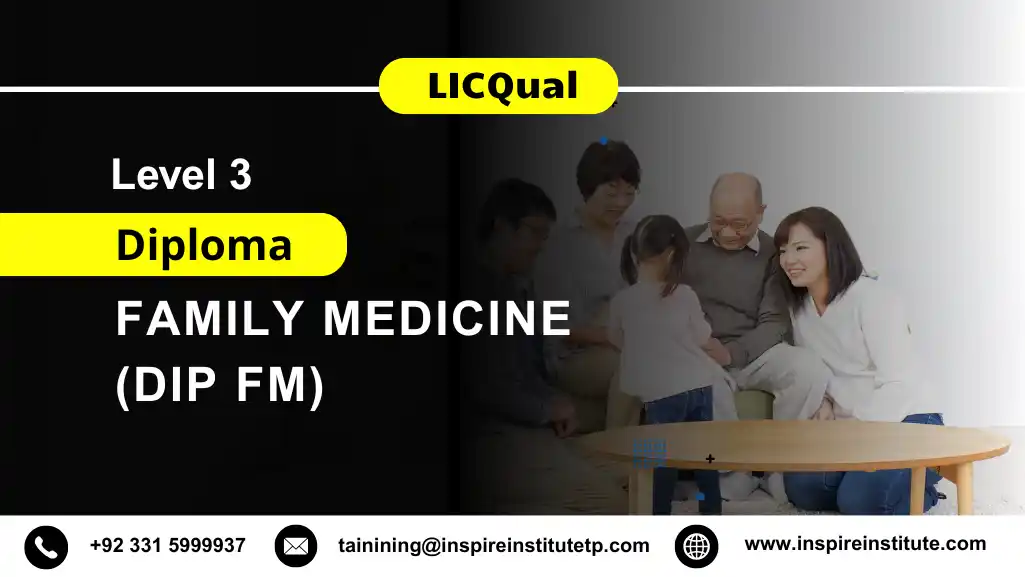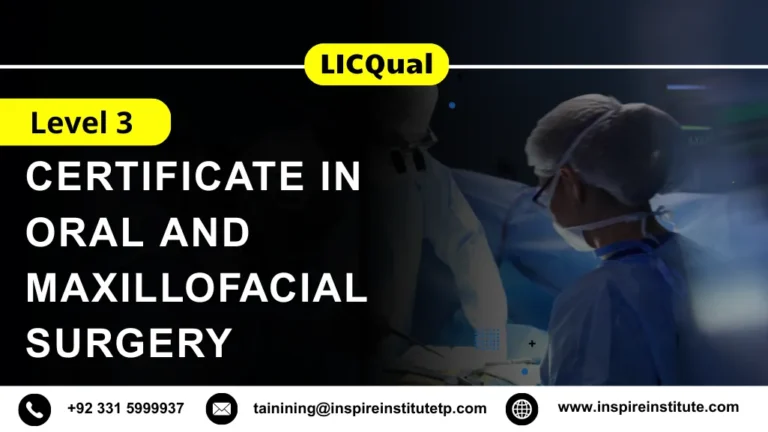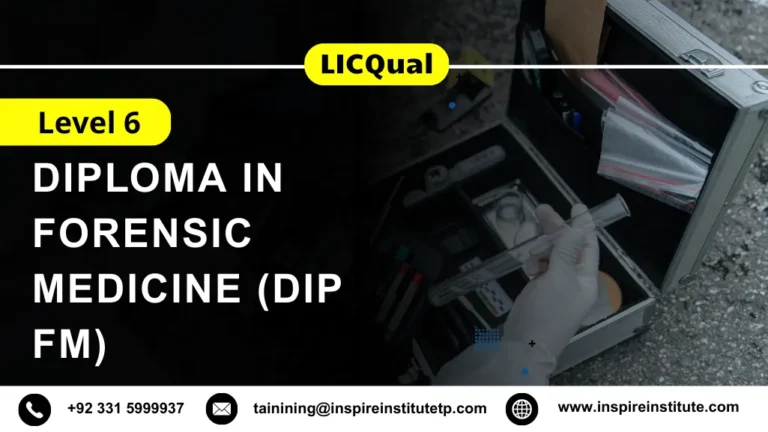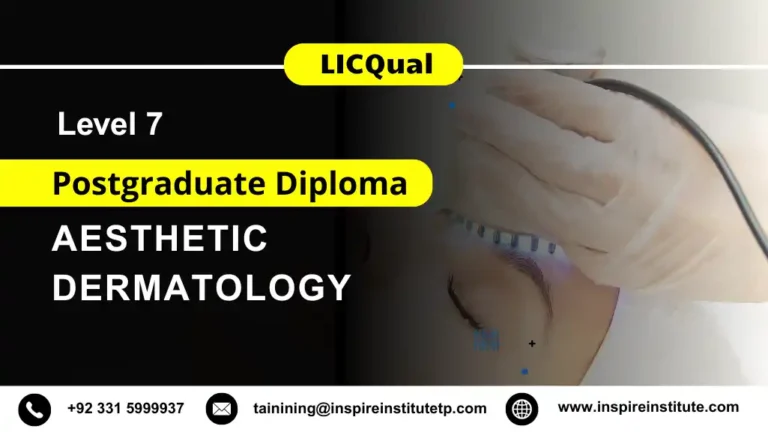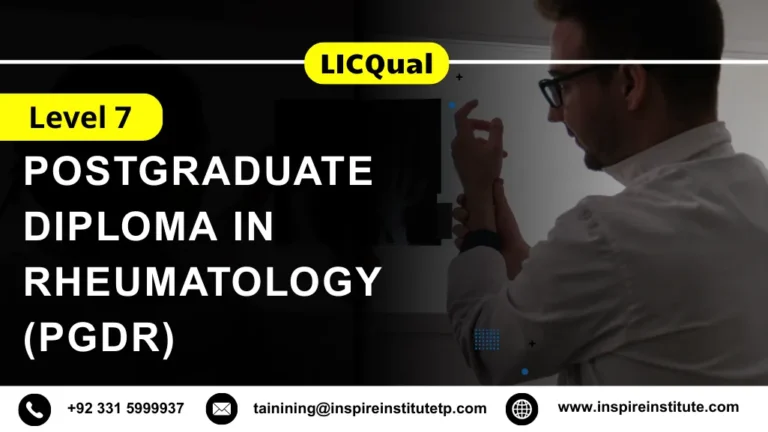LICQual Level 3 Diploma in Family Medicine (Dip FM)
The LICQual Level 3 Diploma in Family Medicine (Dip FM) is a UK-accredited programme designed for healthcare professionals who aim to build advanced knowledge and clinical skills in primary care, patient management, and holistic treatment approaches. With the growing demand for family medicine specialists worldwide, this qualification empowers practitioners to deliver effective healthcare in both clinical and community settings.
This course focuses on the core principles of family medicine, including preventive healthcare, diagnosis, treatment, and management of acute and chronic conditions across all age groups. Learners gain expertise in patient-centered care, health promotion, and disease prevention, enabling them to provide comprehensive medical services that address the physical, psychological, and social aspects of health.
Through its assignment-based structure, the LICQual Level 3 Diploma in Family Medicine ensures flexibility, allowing healthcare professionals to balance academic progression with work responsibilities. The programme integrates advanced theoretical knowledge with practical application, preparing learners to respond effectively to the evolving healthcare needs of families and communities.
Participants will develop essential competencies in clinical assessment, treatment planning, medical decision-making, and multidisciplinary collaboration. This training equips professionals to manage diverse cases in family practice, from routine check-ups and chronic disease management to emergency care, ensuring improved patient outcomes and long-term well-being.
As a UK-recognised qualification, this diploma enhances professional credibility and career opportunities for doctors, nurses, healthcare assistants, and aspiring family physicians. It opens pathways to advanced study, specialist training, or leadership roles in primary care and healthcare education.
The LICQual Level 3 Diploma in Family Medicine (Dip FM) is an invaluable programme for professionals dedicated to improving community health and advancing their careers. By combining evidence-based learning with practical skills, it equips learners to deliver safe, effective, and holistic medical care in today’s dynamic healthcare environment.
Why Choose this Qualification
The LICQual Level 3 Diploma in Family Medicine (Dip FM) is a UK-accredited qualification designed for healthcare professionals seeking to enhance their knowledge and practical skills in primary care, patient management, and community health services. This course combines advanced theoretical learning with practical applications, enabling learners to manage acute and chronic conditions, implement preventive healthcare strategies, and provide patient-centered care essential in modern medical practice. Designed as an assignment-based programme, it offers flexibility for professionals balancing clinical responsibilities with further education.
Key Reasons to Choose this Qualification:
Specialist Knowledge: Gain a comprehensive understanding of family medicine, including health promotion, disease prevention, chronic disease management, and emergency care in community and hospital settings. Learn evidence-based approaches to diagnosis, treatment planning, and holistic care, equipping professionals to deliver safe, effective, and compassionate medical services.
Practical Application: Develop competence in conducting medical assessments, managing diverse patient conditions, supporting families with preventive care strategies, and collaborating with multidisciplinary teams. Learners also gain skills in treatment planning, patient counseling, and managing both routine and complex medical cases across different age groups.
UK-Accredited Diploma: Earn a UK-recognised qualification that validates expertise in family medicine and enhances professional credibility. Accreditation ensures alignment with international healthcare standards, making this diploma valuable for doctors, nurses, general practitioners, healthcare assistants, and allied health professionals.
Flexible Learning Pathway: Benefit from an assignment-based structure that allows learners to progress at their own pace while continuing to work in clinical or community settings. This flexible format is ideal for busy healthcare professionals who wish to advance academically without disrupting patient care.
Evidence-Based Training: Explore current research, clinical protocols, and best practices in family medicine. The programme emphasises safe and effective interventions, patient engagement, ethical practice, and multidisciplinary approaches to improving outcomes for individuals and families in diverse healthcare environments.
Career Development: Expand career opportunities in hospitals, clinics, primary care practices, community health services, and healthcare education. The LICQual Level 3 Diploma in Family Medicine equips learners with the expertise to contribute to improved healthcare delivery and professional growth within the sector.
The LICQual Level 3 Diploma in Family Medicine (Dip FM) empowers healthcare professionals with the knowledge, skills, and UK-accredited recognition necessary to deliver high-quality, evidence-based primary care. It is an essential qualification for those looking to advance their careers while improving patient outcomes in the growing field of family medicine and community healthcare.
Course Overview
LICQual UK Awarding Body
Average Completion Time:
4-12 Months
Study Units: 6 Units
Evidence & Assignment Based
Mandatory Units
Who Should Take This Course
The LICQual Level 3 Diploma in Family Medicine (Dip FM) is a UK-accredited qualification designed for healthcare professionals who wish to develop advanced knowledge and practical skills in primary care, general medical practice, and family health management. This course is ideal for practitioners aiming to improve patient outcomes, implement evidence-based interventions, and progress within the specialised field of family medicine. It equips learners with in-depth theoretical insights and practical approaches to diagnosis, treatment, chronic disease management, and preventive healthcare, supporting both professional growth and improved quality of care in clinical and community settings.
This course is suitable for:
Nurses and Healthcare Assistants: Professionals seeking to enhance their expertise in patient assessment, chronic disease care, and preventive health strategies, enabling them to deliver safe, effective, and family-centered healthcare.
General Practitioners and Physicians: Clinicians wishing to strengthen their skills in diagnosis, treatment planning, and holistic patient management across all age groups to optimise healthcare outcomes in family practice.
Aspiring Specialists: Healthcare professionals preparing for higher-level qualifications or specialist pathways in primary care, community medicine, or family health who want to establish a strong academic and clinical foundation.
Allied Health Professionals: Practitioners such as physician associates, paramedics, and public health workers aiming to broaden their competencies in community-based healthcare, patient counseling, and preventive care.
Healthcare Educators and Trainers: Professionals interested in advancing their knowledge of family medicine to support teaching, research, or evidence-based training within healthcare education.
Healthcare-Oriented Learners: Individuals with a professional interest in general medicine and family health who wish to understand the principles, strategies, and impact of family medicine on patient well-being and community health.
The LICQual Level 3 Diploma in Family Medicine (Dip FM) is particularly valuable for healthcare professionals seeking to specialise in family and community medicine, strengthen their clinical expertise, and achieve a UK-accredited qualification. By combining evidence-based learning with practical application, this diploma supports career progression, professional recognition, and the ability to meet the growing demand for skilled family medicine practitioners in modern healthcare.
Course Benefits
The LICQual Level 3 Diploma in Family Medicine (Dip FM) provides significant benefits for healthcare professionals seeking to enhance their expertise in general practice, primary care, and family health management. By combining advanced theoretical knowledge with practical application, this diploma equips learners to deliver holistic medical care, implement effective treatment strategies, and promote long-term patient well-being. Designed as a flexible, assignment-based programme, it supports professional development while maintaining clinical and academic excellence in family medicine practice.
Key Benefits of the Course:
- Specialist Knowledge: Gain a comprehensive understanding of family medicine, including diagnosis, treatment, chronic disease management, and preventive healthcare. Learners explore conditions across all age groups—from pediatrics to geriatrics—enabling evidence-based clinical decisions and effective patient-centered care.
- Practical Application: Develop competence in patient consultation, clinical assessment, prescribing practices, and health promotion. Learners also gain skills in preventive medicine, chronic disease monitoring, and coordinating care across multidisciplinary teams, ensuring practical application in both primary care and community settings.
- Recognised Qualification: Earn a UK-accredited diploma that validates advanced expertise in family medicine and opens professional opportunities in general practice, hospitals, community health centers, and healthcare education. Accreditation ensures alignment with international healthcare standards and global best practices.
- Flexible Learning Pathway: Benefit from an assignment-based structure that allows learners to progress academically while continuing to meet professional and clinical responsibilities. This flexible format is ideal for busy practitioners balancing patient care with further education.
- Evidence-Based Training: Explore the latest research, medical guidelines, and clinical protocols in family practice, ensuring safe, effective, and evidence-driven healthcare delivery. Learners are trained to adopt modern approaches to patient care while prioritising safety, quality, and ethical standards.
- Career Development: Expand career opportunities in general practice, community health, medical education, and leadership roles within healthcare systems. This diploma strengthens employability and opens pathways to higher-level qualifications in primary care and family medicine.
- Enhanced Patient Care: Contribute to improved health outcomes through accurate diagnosis, preventive strategies, and comprehensive family-oriented care. The ability to manage both acute and chronic conditions enhances long-term community health and quality of life.
- Professional Growth: Strengthen clinical expertise, patient communication, and collaborative skills for effective interdisciplinary teamwork. This diploma prepares healthcare professionals to play a central role in family medicine, improving patient care and advancing professional recognition.
The LICQual Level 3 Diploma in Family Medicine (Dip FM) equips learners with advanced knowledge, practical skills, and a UK-recognised qualification. It empowers healthcare professionals to expand their expertise, deliver improved patient outcomes, and pursue career growth while meeting the growing demand for skilled family medicine practitioners in today’s healthcare systems.
Eligibility Criteria
The LICQual Level 3 Diploma in Family Medicine (Dip FM) is a UK-accredited programme designed for healthcare professionals who wish to advance their expertise in general practice, primary healthcare, and patient-centered family medicine. This assignment-based qualification blends advanced theoretical learning with practical applications, making it suitable for nurses, general practitioners, allied health professionals, and healthcare educators aiming to strengthen their clinical skills in family medicine. By meeting the entry requirements, learners ensure they are fully prepared to succeed in the programme and confidently apply their knowledge in both clinical and community healthcare settings.
Educational Background:
Applicants must hold a recognised healthcare qualification such as a nursing degree, diploma in healthcare practice, medical degree, or an equivalent qualification. Those with Level 2 or Level 3 qualifications in healthcare, medicine, or related fields may also be considered. Equivalent international qualifications will be assessed on a case-by-case basis to ensure suitability for the programme.
Professional Experience:
A minimum of one year of clinical, community healthcare, or primary care experience is recommended. Prior exposure to general practice, family medicine, or patient-centered care is advantageous, though motivated healthcare professionals without direct family medicine experience may also apply.
Age Requirement:
Learners must be at least 18 years of age at the time of enrolment, ensuring they possess the professional maturity, responsibility, and clinical judgment required for advanced training in family medicine.
Language Proficiency:
Since the programme is delivered in English, learners should demonstrate proficiency in reading, writing, and communication. A minimum IELTS score of 6.0 or an equivalent qualification is recommended for non-native English speakers to ensure successful completion of assignments and full engagement with course materials.
Technical Requirements:
Applicants should have access to a computer or laptop with a stable internet connection, as well as basic IT skills to manage digital resources, conduct research, and submit assignments through online platforms.
Required Documents:
Submission of a valid ID or passport, proof of educational qualifications, and evidence of professional experience (if applicable) is necessary for registration. Additional documentation may be required for applicants presenting international qualifications.
The Qualification Process
LICQual Level 3 Diploma in Family Medicine (Dip FM) follows a structured pathway to ensure learners gain comprehensive knowledge, practical skills, and professional competence in community oral healthcare.
Step 1: Self-Assessment
Learners review the entry requirements to confirm eligibility. Candidates with a background in dentistry, oral health, or public health are encouraged to apply.
Step 2: Registration
Complete the registration process by submitting required documents such as proof of qualifications, a valid ID, and payment of enrollment fees.
Step 3: Induction
An induction session is conducted to:
- Verify learner eligibility and documentation.
- Introduce study materials, learning outcomes, and assessment procedures.
Step 4: Learning and Evidence Submission
Learners complete assignments, case studies, and practical exercises demonstrating competence in public health dentistry, community oral health assessment, preventive strategies, and program planning.
Step 5: Feedback and Revision
Assessors review submitted evidence and provide constructive feedback. Learners can revise and resubmit work to meet all required standards.
Step 6: Competence Validation
Final submissions are evaluated to confirm that learners have met all theoretical and practical learning outcomes.
Step 7: Internal Quality Assurance (IQA)
The IQA team reviews the assessment process to ensure accuracy, fairness, and compliance with international standards.
Step 8: External Verification (EQA)
External verifiers validate the authenticity and quality of learner achievements.
Step 9: Certification
Upon successful verification, learners are awardedLICQual Level 3 Diploma in Family Medicine (Dip FM), demonstrating advanced proficiency in community oral healthcare and preparing them for professional growth in dental public health, preventive dentistry, and healthcare policy.

